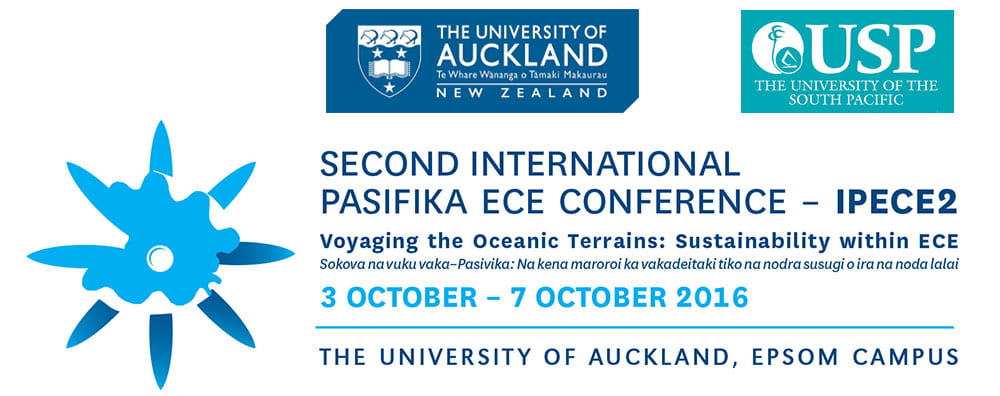Second International Pasifika ECE Conference - IPECE2
03 October 2016 - 07 October 2016Important announcement:
In view of ongoing recovery efforts in Fiji since tropical cyclone Winston, the IPECE2 will no longer be held in Fiji but instead will take place in New Zealand at the University of Auckland’s Epsom Campus. We apologize for any inconvenience this may have caused. At this time we would also like to extend our thoughts and prayers to the people of Fiji.

Second International Pasifika ECE Conference – IPECE2
03 October 2016 – 07 October 2016
Location: Faculty of Education and Social Work, University of Auckland
Contact info: Manutai Leaupepe
Contact email: m.leaupepe@auckland.ac.nz
Voyaging the Oceanic Terrains: Sustainability in Pasifika ECE
Sokova na vuku vaka–Pasivika: Na kena maroroi ka vakadeitaki tiko na nodra susugi o ira na noda lalai
The First International Pasifika ECE Conference was hosted by the University of Auckland’s Faculty of Education from the 30th January – 3rd February, 2013. The conference theme ‘A call from the deep: Reclaiming our Future’, encapsulated the relationship of Pacific peoples and incorporated the metaphor of the ocean that required the ability to draw from the depths of Pacific knowledges, languages and cultures.
Thus enhancing the quality of learning, teaching and care of children within Pasifika early childhood education (ECE) services, while significantly contributing to the general ECE sector. The conference represented the ‘dreams and visions’ of past and current academics associated with the former Auckland College of Education, and the current Faculty of Education and Social Work.
The conference marked a significant milestone in the development of Pasifika ECE within Aotearoa New Zealand, the Pacific region and internationally. It provided a unique time and space for academics, researchers, scholars, and educators from across the region and beyond the shores of Aotearoa New Zealand to share, challenge and celebrate their pedagogical experiences, theoretical knowledges and research.
Keynote Speakers
Professor Airini is Dean at the Faculty of Human, Social & Educational Development, Thompson Rivers University, Canada. Dr Diane Mara received the Insignia of a Member of the New Zealand Order of Merit in 2009 for her services to the Pacific Islands communities. Margaret Simms is Professor of Early Childhood at the University of New England.
Auckland - the City of Sails
Auckland is New Zealand’s largest city and the Polynesian capital of the South Pacific with a multi-cultural population of 1.2 million. A superb conference of world-class standard plus a unique harbour city in the pacific region with spectacular scenery. White sandy beaches, or black if you prefer. Untouched native bush within easy access of city for walking or tramping.
Conference proceedings/abstracts
The theme for the conference continues the critical discussions and lessons learned and shared from the first conference. Hosted by the University of the South Pacific in Suva Fiji, in conjunction with the University of Auckland, the location of the conference within the heart of the Pacific continues to advance stronger and closer working relationships across the region.
The theme for the 2016 conference continues the critical discussions and lessons learned and shared from the first conference. Hosted by the University of the South Pacific in Suva Fiji, in conjunction with the University of Auckland’s Faculty of Education and Social Work, the location of the conference within the heart of the Pacific continues the desire to advance stronger and closer working relationships across the Oceanic region.
The notion of ‘voyaging’ highlights that such a journey is continuous and requires on-going opportunities for academics, researchers, scholars, educators, policy makers and those within the ECE sector to come together. This strengthened by a shared understanding and commitment to continually build and enhance Pasifika ECE.
With the relentless threats concerning climate change within the Pacific region coupled with economical and political anomalies, ideas associated with ‘sustainability’ call for new, innovative and creative ways that espouse Pasifika ECE. This conference provides such an opportunity to do just that. We understand the kinds of synergies that can be engendered within a hybrid of the collective and the potential that exist when people unite for a common purpose. We are excited about the possibilities for collaborations in research, for developing new and strengthening existing networks, and for the exchange of new knowledge and learning.